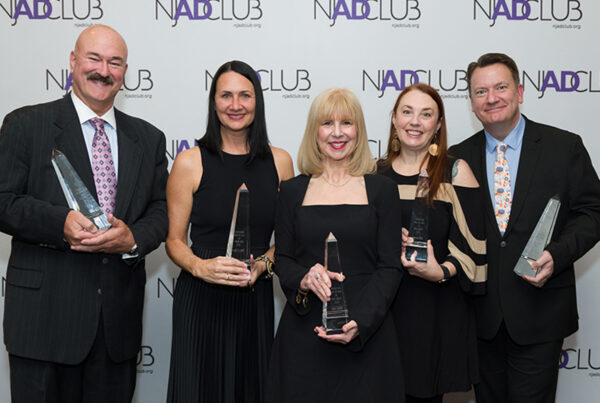Lessons from the NJDMC25

Our marketing team recently attended the 2025 New Jersey Digital Marketing Conference (NJDMC) hosted by dblspc. This year’s theme, “It’s Not Artificial. It’s Evolved,” sparked meaningful conversations about creative intelligence and the impact of AI in marketing, a topic reshaping how agencies and brands navigate today’s rapidly changing digital landscape. The day highlighted how marketers can balance human creativity with AI-driven efficiency, strategically adopt technology, and adapt to a shifting search environment.
Here, we share our key takeaways and insights on how businesses can harness AI to increase impact, strengthen SEO, and develop smarter, more connected marketing strategies.
Enhancing Creativity, Not Replacing
Mark Beal, host and professor at Rutgers University’s School of Communication and Information, discussed the importance of human connection amid the rise of artificial intelligence, noting that as AI advances rapidly, human connection and cultural intelligence remain central to effective marketing. Success with AI involves understanding how people and machines can collaborate. Leaders who excel with AI incorporate it thoughtfully and strategically into workflows, enhancing creativity rather than complicating it.
Effective marketing strategies begin with outcomes and strong campaigns “connect the dots” backward from goals to determine the right blend of creative and technological approaches. Human insight, empathy, and cultural awareness continue to be the foundation, with AI serving as a tool to enhance storytelling and strategy.
Compounding Impact With Loops
A key theme of the day was the difference between simply “adding” tools versus “multiplying” impact. The goal isn’t linear growth but compounding improvement, with each insight building on the last.
Chris O’Neill, CEO of GrowthLoop, emphasized moving from a traditional funnel mindset to a loop approach: plan → launch → learn → relaunch. Continuous iteration helps marketers transform experimentation into sustained growth, with each campaign contributing to organizational intelligence. This approach ensures that insights compound over time rather than remaining siloed within individual initiatives.
Strategy Before Tools
One of the most practical lessons from the conference was the importance of resisting the rush to adopt every new AI solution. Start with strategy first: define the problem or KPI before selecting a tool. Focus on one or two workflows start to finish, removing friction points and ensuring AI genuinely streamlines processes.
Suman Kanuganti, Co-founder and CEO of Personal AI, highlighted the benefits of personal AI, including enhanced productivity and stronger decision-making. Personal AI’s platform specializes in AI models that leverage company-specific data rather than public internet data, precisely capturing your organization’s proprietary knowledge and workflows into AI personas that truly represent your business operations and align with your policies.
For businesses where personal AI isn’t yet feasible, the most practical gains come from targeting AI investments with clear, measurable outcomes, such as reporting automation, content ideation, or SEO monitoring. Global Social & Content Director at Visa, Javid Louis, recommends starting small, scaling thoughtfully, and building repeatable processes that integrate AI without overcommitting to untested or resource-heavy tools.
AI Impact on Search
AI-driven tools like ChatGPT are transforming how people search for information. However, they still depend heavily on top-ranking sites. In fact, 76% of Google AI Overview outputs are based on the top 10 results. During a panel discussion exploring where Search Engine Optimization (SEO) is going in an AI era, led by Matthew O’Such of Find.co, Stephan Bajaio of VibeLogic, and Peter Schauer and Ashley Rodriguez of dblspc, these industry leaders note that SEO remains essential for visibility, authority, and credibility, with Google still attracting billions more monthly visitors than AI search alternatives.
Although the exact ranking signals behind AI-generated search results are still evolving, and AI-driven and traditional search may reach a 50/50 balance by 2030, it’s clear that brands that optimize content for both human and machine understanding will stay ahead.
This means crafting content that not only resonates with audiences through clarity, relevance, and authority, but is also structured in a way that helps AI systems interpret, summarize, and recommend it effectively. As search and discovery become increasingly AI-driven, balancing emotional intelligence with technical optimization will be key to maintaining visibility and trust.
Creativity Meets Efficiency
The NJDMC highlighted that AI is most powerful when it enhances, not replaces, human creativity. The marketers who thrive will use AI to free up time for deeper thinking, storytelling, and innovation, while preserving the craftsmanship that defines strong brand strategy and design.
Sessions throughout the day underscored how creative intelligence and AI can work together to amplify impact, optimize search, and strengthen audience connections. Even as these tools evolve, the human elements of empathy, cultural awareness, and storytelling remain the foundation of marketing that truly resonates.
Ready to elevate your marketing with strategies that balance creativity and efficiency? Schedule a discovery call today to see how our team can help your brand thrive in today’s digital world.


